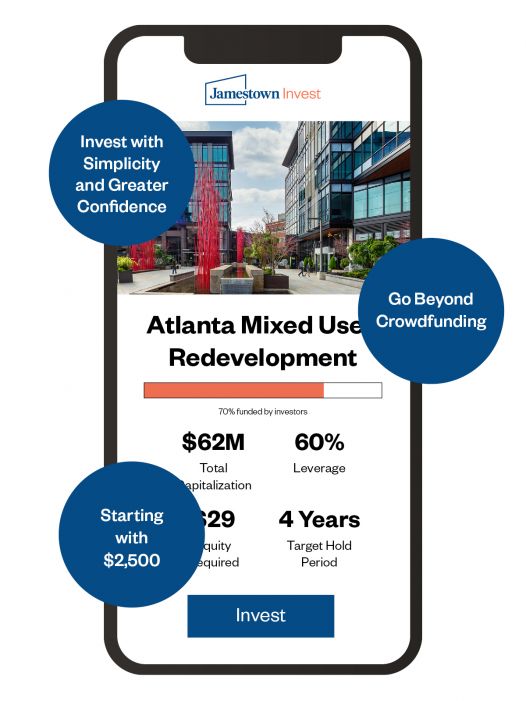Jamestown Featured In

The Jamestown Advantage
Jamestown has consistently focused on maximizing value for its investors through forward thinking and market discipline.
80,000+
German individuals, U.S., and international institutional investors in company history
$11.6 Billion
Assets under management worldwide as of December 31, 2023
8

39+
Year history of transforming spaces into innovation hubs and community centers
See important disclosures below.
An Alternate Way to Invest in Real Estate

Illustrative product experience, does not represent specific investment offered.

Co-Investment
Jamestown co-invests or retains interest in every investment opportunity.

Experienced Sponsor
Consider partnering with a time-tested sponsor that has endured many economic cycles.

Platform Integration
Our in-house team includes: acquisitions, asset management, leasing, portfolio management, development & construction, capital markets, investor relations, and dispositions.

Sustainability & Social Responsibility
Through Jamestown Green and the Jamestown Charitable Foundation, we are focused on efforts to reduce our impact on the environment and support the communities where we own property.
Need Help Getting Started?
Our investment team can assist you in learning more about Jamestown Invest.
- Privacy Policy
- Terms of Use
- Do Not Sell My Personal Information
© 2022 Jamestown. All rights reserved.
IMPORTANT DISCLOSURES: No material on this webpage constitutes an offer to sell or a solicitation of an offer to buy any securities. Information on and photography featuring any real estate property or project is not intended to imply that such asset may be available for investment; pictured properties may be owned by investment funds sponsored by Jamestown that are closed to new investment. Certain information contained in this website may have been obtained from sources outside Jamestown, which in certain cases has not been updated through the date hereof. While such information is believed to be reliable for purposes used herein, no representations are made as to the accuracy or completeness thereof and none of Jamestown, its funds, nor any of their affiliates takes any responsibility for, and has not independently verified, any such information.
NOTICE: This site is operated by Jamestown, LP (“Jamestown”). By accessing this site and any pages thereof, you agree to be bound by the Terms of Use and that you have read and acknowledge the Privacy Policy.
Jamestown is not a registered broker-dealer. Jamestown does not give you investment advice, endorsement, analysis or recommendations with respect to any securities. Nothing within this website shall be deemed to constitute financial or other professional advice to you in any way. All investors must make their own determination of whether or not to make any investment, based on their own independent evaluation of the investment and their risk tolerance.
Neither Jamestown nor any of its officers, directors, agents and employees makes any warranty, express or implied, of any kind related to the adequacy, accuracy or completeness of any such information on this site or the use of such information on this site. This website is only suitable, intended and available for residents of the US who are familiar with and willing to accept the risks associated with private investments and able to bear the loss of their entire investment. This website is not intended for use by any person or entity who is a citizen or resident of or located in any jurisdiction where such distribution, publication, availability or use would be contrary to applicable law or regulation or which would subject Jamestown to any registration requirement within such jurisdiction.

